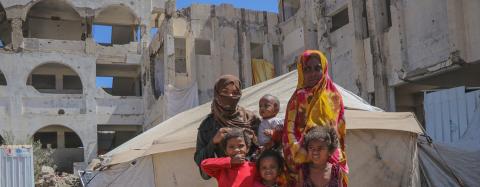The path to peace in Yemen is not strewn with roses


The Yemeni file is entering a new phase as the year 2021 begins, in light of accelerating transformations at the local, regional and international levels. There are indications that the Yemeni war may end this year in the way we have known it since its outbreak in 2015 in the wake of the Iranian-backed Houthi coup against Yemen’s legitimate government.
On the Yemeni level, the government and the Southern Transitional Council (STC) signed the Riyadh Agreement, based on which a new government of 24 ministers was formed.
Since the plane carrying its members to Aden Airport landed, the government has been hit with a barrage of Houthi missiles and a set of complex economic and security issues. The most serious threat facing the government seems to be the ideological and political differences in its midst, as the cabinet is made up of a heterogeneous mix of factions and forces.
The Riyadh Agreement has crowned Saudi efforts to unify the legitimacy front in order to cope with the upcoming transformations and challenges that loom in the region.
The international community views this step as an important pillar of the comprehensive settlement effort in Yemen, which UN envoy Martin Griffiths promotes through his vision known as the “joint declaration” even if opponents of the Houthi project view it only as a reward for the coup.
In terms of timing, the UN-led moves, which are running in parallel to international pressure led by the UK, do not seem to be in the interest of the Yemeni government.
The Yemeni government still needs some time to rearrange matters on the internal front of the legitimacy camp and address the accumulated mistakes before it is ready to sit at the negotiating table or engage in a quick round of military confrontations in order to make up for the losses it recently incurred as a result of the political conflict within the anti-Houthi camp, as was the case with Al-Jawf governorate and the Nihm region which the Houthis were able to recapture.
On the regional level, the region has witnessed an important event that may reflect directly on the Yemeni file. This event is reconciliation between Qatar and the boycotting countries whose boycott was punctuated by severe political and media strife in which Yemen was one of the main battlefields.
Many Yemenis hope that the Gulf reconciliation deal will bear fruit in Yemen by boosting the Arab coalition’s efforts to curb Iranian influence. These efforts aim to reach a just and real peace based on establishing justice and respect for the state and reversing the effects of the Houthi coup, and not enshrining and recognising it as a fait accompli as illustrated by statements made by international officials who talk about peace without features or prerequisites.
The third shift that may cast a shadow over the course of the Yemeni file is related to the victory of US President-elect Joe Biden, whose initial foreign policy indications point to his policies being an extension of former President Barack Obama’s in accommodating the Iranian project.
This means easing sanctions on the Iranian regime, a return to the nuclear agreement and going along with the UK’s vision for a political settlement in Yemen based on supporting Griffiths’ efforts and clinching agreements that are difficult to implement on the ground.
The Stockholm Agreement, for instance, was signed nearly two years ago but did not see any of its provisions implemented except for the ones that serve the Houthi militias’ interests. It was also the case with the ceasefire, which has been respected only by the joint resistance and the Arab coalition, and the adoption of the prisoner exchange deal that many Yemenis believe largely served the Houthis, as it allowed for the release of hundreds of Houthi prisoners of war in exchange for the release by the Houthis of activists, students and journalists who were arrested in their homes in areas under Houthi control.
Based on these considerations, the path of peace in Yemen does not appear to be strewn with roses, as expected scenarios are likely to include a peace agreement under international pressure, which could be similar to the Stockholm Agreement. This could stop the war as we have known it over the last six years but will not end the suffering of Yemenis nor allow them to achieve their basic aspiration of restoring the state.

Yemeni officials on Monday condemned arrests and prosecutions by the Iran-backed Houthi militia directed against media, journalists and celebrities…

Yemen's warring parties are gearing up for new waves of conflict in 2023 amid a lack of decisive steps towards sustainable peace, adding to the suf…

The UAE will help to recruit doctors and deliver crucial supplies for hospitals in Yemen under a major healthcare drive. The Khalifa bin…